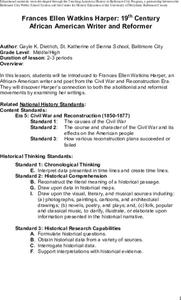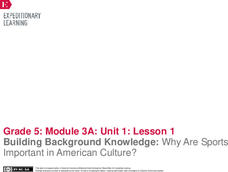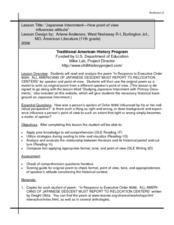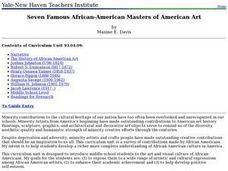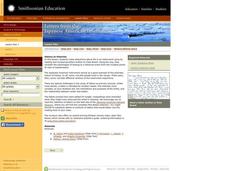Center for History Education
Frances Ellen Watkins Harper: 19th Century African-American Writer and Reformer
Although some African American abolitionists—such as Sojourner Truth and Frederick Douglass—are well known, others, like Frances Ellen Watkins Harper, remain in the shadows of history. Harper was a poet and activist who played an...
National Woman's History Museum
Defying British Rule: Women's Contributions to The American Revolution
Primary and secondary sources are the focus of a lesson that showcases the important role women played during the American Revolution. Pairs review sources and discuss their findings. A close-reading of an informational text leads the...
EngageNY
Building Background Knowledge: Why Are Sports Important in American Culture?
What makes sports so special to many Americans? Scholars ponder the question as they participate in a gallery walk, immersing themselves in images and texts about sports. Pupils also complete a vocabulary strategies anchor chart to...
Curated OER
Jeopardy: American Landmarks
Through this Jeopardy format, learners answer questions relating to famous American landmarks. This presentation could be used with first and second graders, if they were guided through the experience, and with upper elementary learners...
National Endowment for the Humanities
Mark Twain and American Humor
“The Celebrated Jumping Frog of Calaveras County” is famous, in part, because it established a uniquely American form of humor. For this famous story, Mark Twain combines the tall-tale, the dialect story, and satire. Here is a resource...
National Endowment for the Humanities
The Music of African American History
High schoolers examine role spirituals have played in African American history and religion, examine Harriet Tubman's use of spirituals in her work, explore power of spirituals in Civil Rights Movement, and work with oral tradition,...
Curated OER
Famous African-American Fabric Paintings
Students examine famous African-Americans. In this African-Americans lesson, students research and give an oral report on a famous African-American.
Curated OER
Outstanding African Americans Activity
Challenge historians to investigate influential African-Americans through this online research activity. Learners undertake this task using online links, some of which require investigative searching. Print the activity out first, so...
American Institute of Physics
Meet Four Pioneering African American Astronauts
An out-of-this-world resource introduces young scientists to four African American astronauts: Michael P. Anderson, Ronald E. McNair, Guion S. Bluford Jr., and Jeanette J. Epps. Groups read biographies of these individuals and prepare...
American Institute of Physics
African American Inventors in History
A two-part lesson introduces young historians to the work of famous African American inventors. Groups first research and develop a presentation of an inventor that includes biographical information and information about one of their...
Curated OER
I Can Be Whomever I Wish
Famous people who have overcome obstacles are the focus of this language arts and social studies lesson. Pupils are introduced to the concept that they have the ability to overcome obstacles in life. They read selections embedded in the...
Curated OER
Famous Women in American History: Rose Freedman
Fourth graders read about Rose Freedman, a famous American woman. In this famous women in American history instructional activity, 4th graders read a story about Rose Freedman, answer comprehension questions, and complete an associated...
American Institute of Physics
African Americans and the Manhattan Project
A lesson plan about the Manhattan Project will explode young physicists' understanding of the racial attitudes in the United States during and after World war II. Groups select an African American scientist or technician that worked on...
American Institute of Physics
Historical Detective: Edward Alexander Bouchet and the Washington-Du Bois Debate over African-American Education
Young scientists meet Edward Alexander Bouchet who, in 1876, was the first African American to receive a PhD in Physics. This two-part lesson first looks at the debate between Booker T. Washington and W.E.B. Du Bois about the type of...
American Institute of Physics
African Americans and Life in a Secret City
Imagine the lure of being offered a job at a secret site, working on a secret project, and earning higher wages! Such was the approach used to recruit African Americans to Hanford, Washington, one of several sites used to develop...
National Woman's History Museum
African American Activists
Ida B. Wells, Rosa Parks, and Fannie Lour Hammer are three African American activists who stood up for change. Though living in different time periods, all three women sought justice and equality. Class members examine primary source...
American Institute of Physics
The Physicist's War: Dr. Herman Branson and the Scientific Training of African Americans during World War II
The mobilization of soldiers for World War II resulted in a worker shortage in the defense industries, especially in the fields of physics and other sciences. The Engineering, Science, and Management War Training program (ESMWT) was...
Visit St Augustine
African Americans in St. Augustine
A colorful travel brochure reveals why St. Augustine is considered the birthplace of African-American history. Images and maps bring the rich history of the city to life by displaying the many individuals, events, and sites that honor...
Curated OER
Japanese Internment--How Point of View Influences Attitude
How does background and experience influence one's point of view? Dwight Okita's famous poem about the Japanese internment is the text used to explore this essential question. Class members study primary documents to gain the necessary...
Maryland Department of Education
Our Children Can Soar
Amazing efforts of African American leaders are celebrated in a lesson on civil participation. The engaging resource focuses on primary and secondary sources to analyze the impact of African American leaders such as Ella Fitzgerald....
Teaching American History
A Word Fitly Spoken: Lincoln's Most Famous Speeches on Union
Abraham Lincoln's words carried American democracy through one of its most tenuous and violent moments in the nation's short history. Explore an interactive timeline that places events of the 19th century in the context of Lincoln's...
Curated OER
Seven Famous African-American Masters of American Art
Students examine seven different African-American artists. In groups, they use the internet to identify their contribution and techniques to the art world and examine the time period in which the artwork was produced. To end the...
Curated OER
Letters from the Japanese American Internment
Students examine letters of Japanese-American children during internment in World War II. They discover what it was like in the camps and how they were treated once they were released. They also view photographs of the camps.
Curated OER
Images of the American Revolution
Learners analyze several documents as they research the Revolutionary War. They evaluate documents and examine them for bias and perspective. They use their research to write monologues from the point of view of a famous Revolutionary...
Other popular searches
- Famous American Immigrants
- Famous American Women
- Timeline on Famous Americans
- Famous American Pioneers
- Famous American Presidents
- Famous Americans Pocahontas
- Famous Americans in History
- Famous Americans Over 65
- Research a Famous American
- History Famous Americans
- 10 Famous Americans
- Famous Americans Sites


